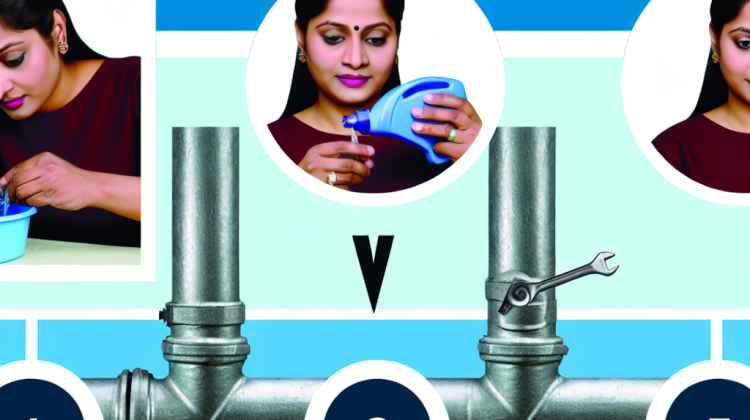
Did you know that many old houses still have galvanized plumbing? It’s true! Galvanized plumbing is made of iron pipes coated with a layer of zinc to help prevent rust. These pipes were popular from the 1800s until the 1960s. However, many folks today don’t know how to take care of these pipes, which can lead to serious plumbing issues down the line.
Back in the day, when builders were putting homes together, galvanized pipes seemed like a great choice. They were cheap and durable, which made them a favorite for water supply lines. But over the years, those zinc coatings can wear off, which allows rust to form. That rust can make your water look brown and taste funny! Yuck! So, knowing how to care for your old pipes is super important.
One common problem with galvanized pipes is clogging due to corrosion inside the pipes. To keep them clear, you can try using vinegar and baking soda regularly. Just mix them up, pour it down the sink, and let it sit for about thirty minutes. Then rinse with hot water. It’s like giving your pipes a nice little spa day! You won’t believe how effective this can be!
Also, check your pipes for leaks or drips. If you notice water pooling under a sink or near the pipes, that could mean trouble. Don’t let that go unchecked! Fixing leaks sooner rather than later can save you from bigger messes and even bigger costs later. It’s like a stitch in time saves nine, right?
If you find your water pressure suddenly drops, that could be a sign of buildup inside the pipes. You might want to consider flushing the system out by running hot water through each faucet for a few minutes. This can help dislodge some of that gunky buildup. Just think of it as a little workout for your plumbing!
Keeping an eye on water quality is also key. If your water smells or tastes strange, it’s time to investigate. Sometimes, if you let the water run for a minute, it can clear out that yucky stuff sitting in the pipes. But if it keeps happening, you might want to call in the professionals. They can check the pipes for rust or other issues that could be causing problems.
One more tip: consider installing a water filter. This can help get rid of any nasty particles that make their way through your galvanized plumbing. Plus, it can improve the taste of your drinking water, making it a win-win situation! You won’t regret investing in cleaner water for your home.
Now that you know some handy ways to care for galvanized plumbing, you’ll be on your way to keeping your pipes in good shape for years to come!
Keeping Galvanized Plumbing in Tip-Top Shape
Galvanized plumbing can be a bit tricky to take care of, but with some simple steps, you can keep it running smoothly. Just remember, it’s all about being a little proactive.
Regular Inspections Are Key
One of the best ways to keep your pipes healthy is to check on them regularly. Look for any signs of rust or corrosion. You can give your pipes a little pat down to feel for any bumps or rough spots. If you see any drips or leaks, it’s time to fix those problems before they get bigger.
Watch the Water Pressure
Next up, make sure you’re keeping an eye on the water pressure. Too high, and it might stress your pipes. You can get a water pressure gauge at the hardware store. Ideally, the pressure should be between 40 and 60 PSI. If it’s too high, think about installing a pressure regulator to take it down a notch.
Keep Things Clear of Debris
Debris and gunk can build up in galvanized pipes, causing clogs. So, be sure to keep your sink drains clean. You can use a strainer to catch food scraps and hair, which makes a world of difference. Also, pouring hot water down the drain once in a while can help clear out any gunk that might be sneaky.
Watch Out for Hard Water
If you’ve got hard water, that can also cause issues. Minerals can build up and create blockages. Installing a water softener can help. This clever device helps break down those minerals, keeping your pipes clear and happy.
Prevent Freezing
Don’t forget about the cold months! In winter, make sure your pipes don’t freeze. Open cabinets to let warm air circulate. You can also let a trickle of water run during especially cold nights. Trust me, it’s worth it to avoid a burst pipe!
Use Non-Corrosive Cleaners
When it comes to cleaning, avoid harsh chemicals. Instead, opt for non-corrosive cleaners. These are gentler on your pipes. You can even make your own cleaner using vinegar and baking soda. It’s safe, effective, and good for the environment!
Keep an Eye on Your Water Bill
Lastly, keep your eye on your water bill. If it starts to creep up, it might mean there’s a leak somewhere. Sniff around your house. Just a little leak can waste a lot of water and money. Don’t let it sneak past you!
Just remember, with a little care, your galvanized plumbing can last for decades. In fact, proper maintenance can increase its lifespan by about 25%, keeping your home running smoothly!
“`html
How to Maintain Galvanized Plumbing FAQ
What is galvanized plumbing?
Galvanized plumbing is made from steel pipes that have a special coating of zinc. This coating helps prevent rust and keeps the pipes strong for a long time.
How can I tell if I have galvanized pipes?
To check if you have galvanized pipes, look for gray metal pipes in your basement or walls. If you tap them and they sound hollow, they might be galvanized.
What are signs that my galvanized pipes need repair?
- Low water pressure
- Rusty or discolored water
- Leaks or water stains on walls or ceilings
How can I clean galvanized pipes?
You can clean galvanized pipes by using a vinegar and water mixture. Just pour some into the pipes and let it sit for a few hours, then flush with clean water.
How often should I maintain my galvanized plumbing?
It’s a good idea to check your galvanized plumbing once a year for leaks or rust. If you notice any problems, fix them right away!
Can I replace galvanized pipes myself?
If you’re handy, you can replace galvanized pipes yourself! Just be sure to turn off the water, gather your tools, and follow safety guidelines.
What happens if galvanized pipes rust?
If galvanized pipes rust, it can cause leaks and lower water pressure. It’s really important to fix any rust before it gets worse!
Should I switch to a different type of plumbing?
If your galvanized pipes are very old or have a lot of rust, you might want to switch to copper or PVC pipes. They last longer and don’t rust!
How do I prevent my galvanized pipes from rusting?
To keep your pipes from rusting, make sure they’re properly sealed. You can also avoid letting water sit in the pipes for too long.
What should I do if my galvanized pipes start leaking?
If you have a leak, turn off the water right away! Then, call a plumber to fix it, or try patching it yourself with plumber’s tape.
“`
Conclusion
To keep your galvanized plumbing in tip-top shape, it’s super important to check for leaks and rust. Regularly looking for any signs of water dripping or strange stains can save you from bigger problems later. If you spot any rust, don’t just ignore it! Cleaning it off with a wire brush can help, and using some paint meant for metal can protect it from getting worse. Also, remember to keep an eye on the water pressure. If it’s too high, it can wear down the pipes faster than you’d think.
Another great tip is to run hot water through the pipes every now and then. This can help break down any gunk or build-up that might be lurking inside. Keeping the pipes insulated, especially when it’s cold outside, can prevent them from freezing and cracking, too. And hey, don’t forget to flush your system occasionally to keep things moving smoothly. By staying on top of these tasks, you can make sure your galvanized plumbing lasts a long time and saves you from headaches down the road! Happy plumbing!
